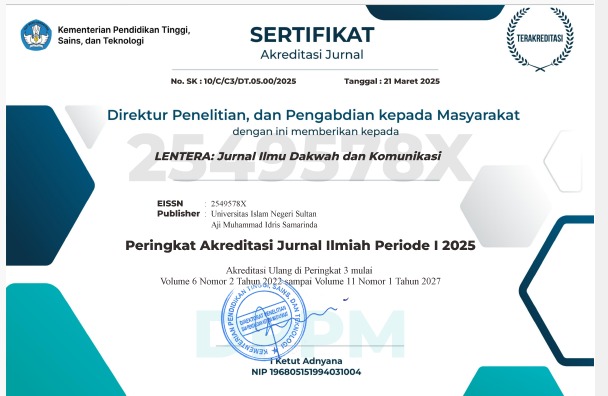The Role of Students' Green Mindset in Protecting Nature
An Inner Perspective
Abstract
Generation Z, which is synonymous with the internet and cyberspace, also has concern for the environment. This study aims to describe the role of students’ green mindset in protecting nature in their fourth semester. This study uses a qualitative, naturalistic paradigm. Primary data was taken from participatory observations of 107 students in the 2020 and 2021 classes of the Islamic Communication and Broadcasting study program and interviews with 11 of them. The results of this study were: (1) They have a growth mindset to protect nature; (2) The green mindset they have had has been implemented with real behavior, namely holding deliberations with faculty student organizations to protect the surrounding environment, educating elementary school-age children to sort out the trash around them, doing a simple campaign on the social media they have, writing green in online media, and carrying out real actions in the field (planting plant seeds around the faculty and inviting campus residents to collect cooking oil waste). Overall, students' green mindsets should be cultivated by providing a green curriculum with several green courses to manage environmental challenges.
References
Dimock, M. (2019). Defining generations: Where Millennials end and Generation Z begins. Pew Research Center, 1–7. https://www.pewresearch.org/fact-tank/2019/01/17/where-millennials-end-and-generation-z-begins/
Diva, N., Rembulan, R., & Firmansyah, E. A. (2020). Perilaku Konsumen Muslim Generasi-Z Dalam Pengadopsian Dompet Digital. Valid Jurnal Ilmiah, 17(2), 111.
Duchi, L., Lombardi, D., Paas, F., & Loyens, S. M. M. (2020). How a growth mindset can change the climate: The power of implicit beliefs in influencing people’s view and action. Journal of Environmental Psychology, 70(June). https://doi.org/10.1016/j.jenvp.2020.101461
Fadli, M. R. (2021). Memahami desain metode penelitian kualitatif. Humanika, 21(1), 33–54. https://doi.org/10.21831/hum.v21i1.38075
Fahlevi, M. R. (2019). Strategi Adaptasi Masyarakat Kelurahan Mugirejo Kota Samarinda di Dalam Menghadapi Banjir. EJournal Sosiatri-Sosiologi, 7(1), 154–168. reza_fahlevy@gmail.com
Hayati, A. N. (2021). Ta’awun dalam Pandemi. FICOSIS, 1, 545–563.
Kholis, N. (2021). Dakwah Virtual, Generasi Z dan Moderasi Beragama. Iqtida, Journal of Da’wah and Communication, 1(2), 155–168.
Kristyowati, Y. (2021). Generasi “Z” Dan Strategi Melayaninya. Ambassador: Jurnal Teologi Dan Pendidikan Kristiani, 2(1), 2. stt-indonesia.ac.id › journal › index
Mulyadi, M. (2013). Penelitian Kuantitatif Dan Kualitatif Serta Pemikiran Dasar Menggabungkannya. Jurnal Studi Komunikasi Dan Media, 15(1), 128. https://doi.org/10.31445/jskm.2011.150106
Nur Annisa, N. A., Hakim, A., & Setyowati, R. D. N. (2022). Analisis Status Mutu Air Sungai Mahakam Kota Samarinda Menggunakan Metode Indeks Pencemaran. Jurnal Serambi Engineering, 7(4), 4201–4210. https://doi.org/10.32672/jse.v7i4.5106
Oktavianti, N., & Fitriani, D. R. (2021). Hubungan Pengetahuan dengan Kesiapsiagaan Remaja dalam Menghadapi Banjir di Samarinda. Borneo Student Research, 2(2), 909–914.
Rohrich, R. J., & Rodriguez, A. M. (2020). Millennial Leaders: Ready or Not, Here They Come. Plastic and Reconstructive Surgery, 145(5), 1331–1337. https://doi.org/10.1097/PRS.0000000000006753
Schwieger, D., & Ladwig, C. (2018). Reaching and Retaining the Next Generation: Adapting to the Expectations of Gen Z in the Classroom. Information Systems & Computing Academic Professioals, 16(3), 45–54.
Sofia, A. (2021). Konsep Awal Pemberdayaan Masyarakat Oleh ’Aisyiyah. Aplikasia, Jurnal Aplikasi Ilmu-Ilmu Agama, 21(1), 45–58.
Sulaiman, M. E., Setiawan, H., Jalil, M., Purwadi, F., S, C. A., Brata, A. W., & Jufda, A. S. (2020). Analisis Penyebab Banjir di Kota Samarinda. Jurnal Geografi Gea, 20(1), 39–43. https://doi.org/10.17509/gea.v20i1.22021
Wangsa, I. H. S., Tyra, M. J., Lina, Riyanto, A., Ony, J. G., & Fernando, A. (2023). Membangun Komunitas Hijau Melalui Pelatihan “Program Sadar Produk Hijau Melalui Media Sosial” Pada Generasi Milenial di Lampung. Jurnal Abdimas Musi Charitas (JAMC), 7(1).
Zis, S. F., Effendi, N., & Roem, E. R. (2021). Perubahan Perilaku Komunikasi Generasi Milenial dan Generasi Z di Era Digital. Satwika : Kajian Ilmu Budaya Dan Perubahan Sosial, 5(1), 69–87. https://doi.org/10.22219/satwika.v5i1.15550
Copyright (c) 2023 Lentera: Jurnal Ilmu Dakwah dan Komunikasi

This work is licensed under a Creative Commons Attribution-ShareAlike 4.0 International License.
Penulis yang menerbitkan artikel di Lentera: Jurnal Ilmu Dakwah dan Komunikasi setuju dengan ketentuan berikut:
- Penulis memiliki hak cipta artikel dan memberikan hak jurnal untuk publikasi pertama dengan karya yang secara simultan dilisensikan di bawah CC-BY-SA atau The Creative Commons Attribution – ShareAlike Licence.
- Penulis dapat membuat perjanjian kontrak tambahan yang terpisah untuk distribusi non-eksklusif versi jurnal yang diterbitkan dari karya tersebut (misalnya, mempostingnya ke repositori institusional atau menerbitkannya dalam sebuah buku), dengan pengakuan atas publikasi awalnya di jurnal ini.
- Penulis diizinkan dan didorong untuk memposting pekerjaan mereka secara online (misalnya, dalam repositori institusional atau di situs web mereka) sebelum dan selama proses pengajuan, karena dapat menyebabkan pertukaran yang produktif, serta kutipan yang lebih awal dan lebih besar dari karya yang diterbitkan (Lihat The Effect of Open Access)
Authors who publish articles in Lentera: Jurnal Ilmu Dakwah dan Komunikasi agree to the following terms:
- Authors retain copyright of the article and grant the journal right of first publication with the work simultaneously licensed under a CC-BY-SA or The Creative Commons Attribution–ShareAlike License.
- Authors are able to enter into separate, additional contractual arrangements for the non-exclusive distribution of the journal's published version of the work (e.g., post it to an institutional repository or publish it in a book), with an acknowledgment of its initial publication in this journal.
- Authors are permitted and encouraged to post their work online (e.g., in institutional repositories or on their website) prior to and during the submission process, as it can lead to productive exchanges, as well as earlier and greater citation of published work (See The Effect of Open Access).












.png)
